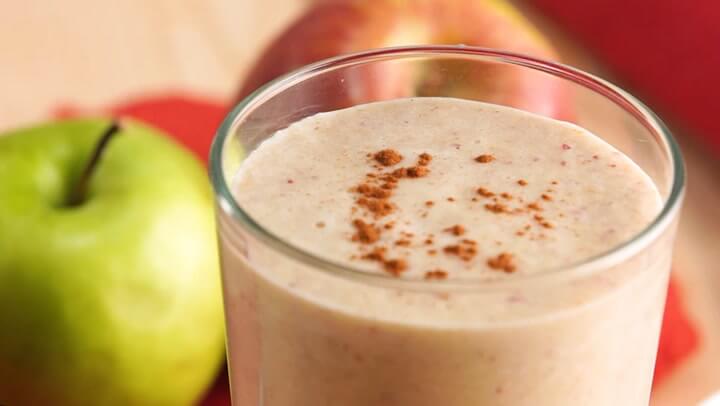The humble apple, a fruit that has graced our lives for centuries, is more than just a tasty snack.
It’s a veritable powerhouse of nutrition, packed with essential vitamins, minerals, and antioxidants that offer a myriad of health benefits.
From supporting heart health to aiding in weight management, apples truly deserve their reputation as a superfood.
In this article, I’ll take you on a journey through the world of apples, exploring their nutritional value, the countless benefits they offer, potential side effects to be aware of, and creative ways to incorporate them into your daily meals.
So, grab an apple, and let’s dive in!
The Nutritional Breakdown of Apples
Before we delve into the numerous benefits of apples, let’s first understand what makes them so nutritious.

One medium-sized apple (around 182 grams) packs a punch with:
- Calories: Approximately 95 calories, making it a low-calorie snack option.
- Fiber: A whopping 4.4 grams of fiber, is essential for maintaining a healthy digestive system.
- Vitamin C: About 14% of the recommended daily intake, boosting your immune system and acting as a powerful antioxidant.
- Vitamin K: Around 5% of the recommended daily intake, is crucial for blood clotting and bone health.
- Potassium: Approximately 5% of the recommended daily intake, supporting heart health and muscle function.
- Antioxidants: Apples are rich in antioxidants like quercetin, catechin, and chlorogenic acid, which help neutralize harmful free radicals in the body.
Apples also contain small amounts of other vitamins and minerals, such as vitamin E, thiamin, riboflavin, niacin, and copper. It’s no wonder that apples are often hailed as a superfood!
6 Major Health Benefits of Apples
Now that we’ve uncovered the nutritional profile of apples, let’s dive into the numerous health benefits they offer:
Supporting Heart Health
Apples are heart-friendly fruits due to their high soluble fiber content, which can help lower cholesterol levels.

The antioxidants found in apples, such as quercetin, have also been shown to reduce inflammation and improve blood vessel function, further supporting cardiovascular health.
Aiding in Weight Management
With their low-calorie count and high fiber content, apples are an excellent choice for those looking to manage their weight.
The fiber in apples helps promote feelings of fullness, reducing the likelihood of overeating.

Additionally, the natural sweetness of apples can curb cravings for unhealthy snacks, making them a guilt-free indulgence.
Boosting Gut Health
The fiber found in apples is prebiotic, meaning it feeds the beneficial bacteria in your gut.
A healthy gut microbiome is essential for optimal digestion, nutrient absorption, and overall well-being. Apples may also help alleviate constipation due to their high fiber and water content.
Supporting Bone Health
Apples contain various minerals, including boron, which has been linked to improved bone health and a reduced risk of osteoporosis.
The antioxidants found in apples may also help protect bone cells from damage caused by free radicals.
Promoting Brain Function
The antioxidants present in apples, such as quercetin and chlorogenic acid, have been shown to have neuroprotective properties.
These compounds may help reduce oxidative stress and inflammation in the brain, potentially lowering the risk of neurodegenerative diseases like Alzheimer’s and Parkinson’s.
Regulating Blood Sugar Levels
Despite their natural sweetness, apples have a low to moderate range (36-53) glycemic index, meaning they don’t cause rapid spikes in blood sugar levels.

The fiber and polyphenols in apples may also improve insulin sensitivity, making them a suitable option for individuals with diabetes or those at risk of developing the condition.
Potential Side Effects and Precautions
While apples are generally safe for most people, there are a few potential side effects and precautions to consider:
- Allergies: Some individuals may be allergic to apples or experience cross-reactivity with other fruits and vegetables from the same family. If you experience any allergic reactions, such as itching, swelling, or difficulty breathing, seek medical attention immediately.
- Digestive Issues: Due to their high fiber content, consuming too many apples at once may cause digestive discomfort, such as bloating or gas, especially for those with sensitive stomachs.
- Pesticide Residue: Conventionally grown apples may contain traces of pesticides, which can be harmful if consumed in large quantities. To minimize exposure, opt for organic apples or wash them thoroughly before consuming.
- Tooth Enamel Erosion: The acidic nature of apples can potentially contribute to tooth enamel erosion over time. To mitigate this risk, it’s advisable to rinse your mouth with water after eating apples or wait at least 30 minutes before brushing your teeth.
As with any food, moderation is key.
If you have any existing medical conditions or concerns, it’s always best to consult with a healthcare professional before making significant dietary changes.
Delicious Ways to Incorporate Apples into Your Diet
Now that we’ve explored the nutritional benefits and potential side effects of apples, let’s dive into some creative and delicious ways to incorporate them into your daily meals:
Apple Salads
Apples add a refreshing crunch and natural sweetness to salads.
Try combining diced apples with mixed greens, nuts, dried cranberries, and a light vinaigrette for a nutritious and satisfying lunch or side dish.

Apple Smoothies
Blend together apples, yogurt, spinach (or kale), and your favorite nut butter for a nutrient-packed smoothie that’s perfect for breakfast or a post-workout snack.

Baked Apples
Core apples and stuff them with a mixture of oats, nuts, dried fruit, and spices like cinnamon and nutmeg.
Bake until tender and enjoy a warm, comforting dessert that’s both delicious and nutritious.

Apple Cider Vinegar
Apple cider vinegar has gained popularity for its potential health benefits, such as aiding in weight loss, improving digestion, and lowering blood sugar levels.

Add a tablespoon or two to a glass of water and enjoy it as a refreshing beverage.
Apple Slices with Nut Butter
Sliced apples paired with your favorite nut butter make for a satisfying and protein-packed snack.
Add a sprinkle of cinnamon or a drizzle of honey for an extra flavor boost.

Apple Pancakes or Waffles
Grate or finely chop apples and fold them into your favorite pancake or waffle batter for a delightful twist on a classic breakfast dish.
Apple Slaw or Salsa
Shredded or diced apples can add a delightful crunch and sweetness to coleslaws or salsas, providing a refreshing contrast to savory flavors.

Here are some additional creative ways to incorporate apples into your diet:
- Apple chips: Thinly slice apples and bake them in the oven for a crispy, healthy snack.
- Apple butter: Cook down apples with spices like cinnamon and nutmeg for a delectable spread.
- Apple cider: Press fresh apples to create a refreshing and nutritious beverage.
- Apple crumble or pie: Bake apples with a crispy topping or in a flaky crust for a classic dessert.
Remember, the possibilities are endless when it comes to incorporating apples into your diet.
Get creative, experiment with different varieties, and enjoy the delicious and nutritious benefits of this beloved fruit.
The Verdict
An Apple a Day Keeps the Doctor Away
Apples are indeed a powerhouse of nutrition, offering a wide range of health benefits that make them a worthwhile addition to any well-balanced diet.
From supporting heart health and aiding in weight management to promoting gut health and brain function, apples pack a punch that should not be underestimated.
While potential side effects and precautions should be considered, especially for those with specific dietary restrictions or allergies, apples are generally safe for most individuals when consumed in moderation.
As you’ve discovered throughout this article, apples offer a wealth of nutritional benefits that contribute to overall health and well-being.
Their versatility in the kitchen allows for endless possibilities to incorporate them into your daily meals, ensuring that you never get bored with this delightful fruit.

